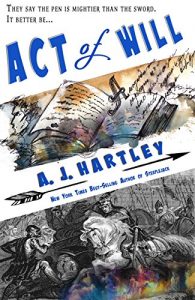Description does not — cannot — take place in an emotional or circumstantial vacuum.
Not that long ago, I offered tips on writing scenes involving sex and violence, and essentially said that dealing with such encounters is almost entirely a matter of understanding and sticking to the point of view of our narrative character. These are the moments in which emotion, experience, and thought process are absolutely critical, and so for the scenes to work, we need to be completely rooted in the observations and feelings of our point of view characters.
I also offered this: “…Point of view is the place where character development meets plot, where emotion is introduced to our narratives, where our readers are given the emotional cues they need to experience our stories as we intend.”
With that in mind, I want to talk today about more general descriptive passages. Describing is something we writers do all the time. Whether we are telling our readers what another character looks like, or what kind of room our point of view characters have entered or what kind of smells or tastes or sensations they are experiencing, we are describing constantly. So getting it right is really important.
I love writing descriptions. Long before I became a professional writer, I knew I was destined for this line of work because I was constantly composing such passages in my head. I would see a sunset and think, “how would I write this?” I’d ask myself the same question upon tasting something exotic and new, or smelling something awful, or… whatever. During my career, I have written descriptions that still evoke pride when I go back to read them.
Always, though, what makes the descriptions work is not just powerful prose and precise word choice. As with those action scenes I’ve written about previously, descriptions of settings and people have to tap into character, into emotion and mind-set and motivation.
Let me put it this way, if we walk into a room we’ve never been in before, we’re going to notice different things about it depending upon our circumstances and how we feel about being there. If we’re relaxed — say, visiting the home of a friend, we might take time to notice the floors, the art on the wall, the framed photos of family arrayed around the room. If, on the other hand, we’ve been brought to a place against our will, we would be more inclined to look for ways out, for details that will tell us more about our “hosts” and their intentions. If we’re trained in such things, we might even look for objects we can turn into weapons or tools of escape.
In the same way, our impressions of someone new will yield very different responses depending on whether this person seems to be an adversary or a friend, a rival or a potential mate, a long lost sibling or a celebrity we’ve been hearing about all our lives.
Now, chances are that we, in the course of our lives, will not be in a position of being taken somewhere against our will. We will likely have few opportunities to meet celebrities and few occasions to encounter mortal enemies. Our characters on the other hand… Well, we do all sorts of shit to them, don’t we?
So when we write these descriptions from THEIR point of view, we need to take into consideration what they might be thinking and feeling, what they’re worried about, if anything, and what their goals are for the encounter that is about to take place. Description does not — cannot — take place in an emotional or circumstantial vacuum.
The other thing to keep in mind when writing description is the simple fact that we have five senses, not just one. We are highly visual creatures, and it’s all too easy to become so caught up in telling our readers how something looks that we neglect to mention how something sounds or feels or smells or tastes. Smells in particular are far too easy to overlook. Our sense of smell is unrefined compared to that of, say, dogs or cats or other hunting mammals. But smells can be among the most evocative of the senses. Aromas and scents can transport us, rekindling memories and emotions long buried. I still grow nostalgic for my childhood in New York and my college years in New England when I smell leaves burning in the fall. My adult daughters often remark upon arriving home for a visit that the scent of our house brings back some of their earliest memories. Taste can have a similar effect.
Again, you want to be true to the point of view of your narrator. All your readers’ sensory experiences should be colored by the emotions and exigencies of your characters. And your descriptions should involve as many of the senses as possible. Within reason, naturally. Your POV character doesn’t need to lick the walls and furniture in order to render a more complete sensory experience. That would just be weird. Unless, of course, you happen to be writing a new take on the Willy Wonka story, in which case have at it!
Keep writing!









 My first book, Children of Amarid, was a fairly standard epic fantasy, though it had the seeds of more within the nuances of its plot. It was my second novel, though, The Outlanders, that convinced me I could succeed as a writer. The reason was, that second book was different. It introduced a technological, crime-ridden world unlike anything I’d ever tried writing. It created an unusual dynamic among three of my lead characters — two of the characters, who were allies, spoke different languages, and they had to rely on the third for translation. But neither of them trusted that third character.
My first book, Children of Amarid, was a fairly standard epic fantasy, though it had the seeds of more within the nuances of its plot. It was my second novel, though, The Outlanders, that convinced me I could succeed as a writer. The reason was, that second book was different. It introduced a technological, crime-ridden world unlike anything I’d ever tried writing. It created an unusual dynamic among three of my lead characters — two of the characters, who were allies, spoke different languages, and they had to rely on the third for translation. But neither of them trusted that third character.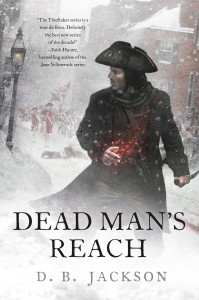 Still, I can say this: It’s easy to grow attached to one particular franchise, one particularly world and set of characters and style of story. Certainly I have written a good deal in the Thieftaker world, and will soon be coming out with new work about Ethan Kaille, Sephira Pryce, et al. The fact is, though, each time I have moved on to a new project, I have tried (admittedly with varying degrees of success) to challenge myself, to force myself to grow.
Still, I can say this: It’s easy to grow attached to one particular franchise, one particularly world and set of characters and style of story. Certainly I have written a good deal in the Thieftaker world, and will soon be coming out with new work about Ethan Kaille, Sephira Pryce, et al. The fact is, though, each time I have moved on to a new project, I have tried (admittedly with varying degrees of success) to challenge myself, to force myself to grow.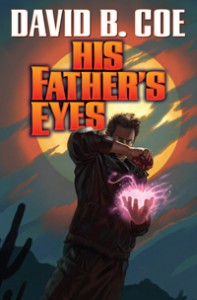 After the LonTobyn books, I moved to Winds of the Forelands and Blood of the Southlands, which demanded far more sophisticated world building and character work. After those, I turned to Thieftaker, adding historical and mystery elements to my storytelling and limiting my point of view to a single character. I also started working on the Justis Fearsson books, which explored mental health issues and were my first forays into writing in a contemporary setting. Then I took on the Islevale books, time travel/epic fantasies that presented the most difficult plotting issues I’ve ever faced.
After the LonTobyn books, I moved to Winds of the Forelands and Blood of the Southlands, which demanded far more sophisticated world building and character work. After those, I turned to Thieftaker, adding historical and mystery elements to my storytelling and limiting my point of view to a single character. I also started working on the Justis Fearsson books, which explored mental health issues and were my first forays into writing in a contemporary setting. Then I took on the Islevale books, time travel/epic fantasies that presented the most difficult plotting issues I’ve ever faced. J.D. Blackrose
J.D. Blackrose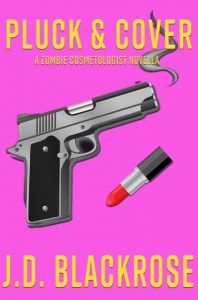 *****
***** I believe my action scenes are pretty effective, and, actually, I would say the same about my sex scenes. But that wasn’t always the case. In the first draft of my very first novel, Children of Amarid, I wrote a sex scene that my editor tore apart. And with good reason. While the rest of the narrative worked pretty well, the sex scene felt completely staged and out of character. And the reason was quite simple: For that one encounter, I forgot about my characters’ points of view and tried to write a sex scene that felt, well, sexy. That didn’t work, because my characters were young and in love, but also inexperienced and still a little awkward with each other. None of that came through in the writing.
I believe my action scenes are pretty effective, and, actually, I would say the same about my sex scenes. But that wasn’t always the case. In the first draft of my very first novel, Children of Amarid, I wrote a sex scene that my editor tore apart. And with good reason. While the rest of the narrative worked pretty well, the sex scene felt completely staged and out of character. And the reason was quite simple: For that one encounter, I forgot about my characters’ points of view and tried to write a sex scene that felt, well, sexy. That didn’t work, because my characters were young and in love, but also inexperienced and still a little awkward with each other. None of that came through in the writing.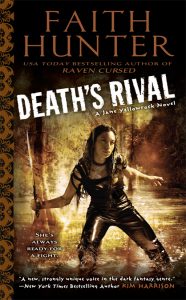 In the same way, action scenes – fight scenes, battle scenes, violent scenes; whatever you want to call them – also hinge on the qualities, histories, experiences, and emotions of our point of view characters. A seasoned fighter, someone who makes their living in a violent world or who was brought up to be a warrior, is going to experience violence quite differently from, well, someone like me, who has little knowledge of fighting technique and scant history with violence and bloodshed. The practiced fighter’s point of view might sound almost clinical – this person will know how to control emotion, how to draw upon skills and observations learned over years of training. The novice’s point of view should come off as far more desperate, fearful, overwhelmed by the frenzy of violence in which they find themselves. Again, point of view is all. One is not necessarily more exciting to read than the other – think of the battle scenes in Faith Hunter’s thrilling, New York Times Bestselling Jane Yellowrock books and in A.J. Hartley’s wonderful Will Hawthorne novels, which are not only entertaining but also a master class in writing voice. Jane is a warrior; Will is SO not.. The scenes in both make for compelling reading, but they couldn’t be more different.
In the same way, action scenes – fight scenes, battle scenes, violent scenes; whatever you want to call them – also hinge on the qualities, histories, experiences, and emotions of our point of view characters. A seasoned fighter, someone who makes their living in a violent world or who was brought up to be a warrior, is going to experience violence quite differently from, well, someone like me, who has little knowledge of fighting technique and scant history with violence and bloodshed. The practiced fighter’s point of view might sound almost clinical – this person will know how to control emotion, how to draw upon skills and observations learned over years of training. The novice’s point of view should come off as far more desperate, fearful, overwhelmed by the frenzy of violence in which they find themselves. Again, point of view is all. One is not necessarily more exciting to read than the other – think of the battle scenes in Faith Hunter’s thrilling, New York Times Bestselling Jane Yellowrock books and in A.J. Hartley’s wonderful Will Hawthorne novels, which are not only entertaining but also a master class in writing voice. Jane is a warrior; Will is SO not.. The scenes in both make for compelling reading, but they couldn’t be more different.